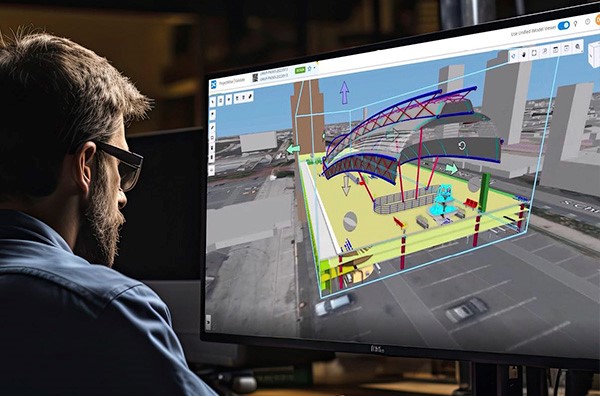As countries around the world make concerted efforts to rapidly accelerate infrastructure innovation to improve citizens’ living standards, we spoke to Lydia Walpole, global senior director of performance at Bentley Systems, about the key role that technology can play.
How has construction technology evolved organically over the recent period and what effect is this having on the industry and the challenges being posed?
I’ve seen a lot of this first-hand with my background as a civil engineer working in infrastructure projects for around 18 years before I moved to Bentley Systems. When I started as a site engineer, it was very much about using paper drawings and documents, taking those out to site and hoping you had the right revision. What I’ve seen over the more recent period is how construction technology has shifted from digitising documents and moving away from paper-based systems to actually digitising decisions. That has really been transformational and I think sometimes we forget the impact that has had. Now, we are more focused on AI and how we embed that across project and programme lifecycles. We are starting to see the use of generative design tools feeding through to predictive maintenance and that’s really helping teams be faster in delivery, reduce risk and extract value from data in real time.
The main challenge in all this is around scale and urgency. With the UK infrastructure investment plan, for example, there is a huge opportunity with £725bn of investment, so we now need to deliver those infrastructure projects smarter, faster and more resiliently and I think the other challenge that it poses on everyone, not just engineers, is around digital literacy and adopting and embracing these digital tools to realise the full value of their potential.
How do you asses where the engineering, construction and infrastructure sector is on its journey to adopting AI and ML technology?
We are certainly past the awareness phase – we hear about AI and machine learning an awful lot in infrastructure now, but we are not yet at that full scale adoption. The sector is quite rightly cautious about it. I think a great example is the rail sector which now has incredibly stringent safety standards and processes that have been developed over years of research and lessons learned and we need to make sure that if we are introducing new technology and new concepts then we have to fully demonstrate that those standards are not just maintained but exceeded. We are definitely seeing momentum where AI is being stress tested in pockets of project delivery, especially in the forefront of planning and scheduling and risk management and early adopters are starting to set the pace in this area.
Are some countries’ industries in a better position that others? Who are the exemplars in this area?
Innovation isn’t bound by geography, it’s really accelerated by leadership, funding and vision. We have seen that in the UK but also in places like Singapore with their virtual city digital twin, the UAE and the Middle East, where the UAE is aiming to become the AI strategy global leader by 2031. We also see it in the US and Brazil where they have long-term digital strategies.
What are the key challenges for the sector?
The industry faces a twin mandate. It needs to deliver at an unprecedented scale and pace if we want to achieve the outcomes that these ambitious investment plans are aiming for, but we have to do that whilst also ensuring sustainability and resilience. We are seeing shortages across projects in the areas of skilled labour and also engineers coming into the industry and this is a challenge. We also have the challenge of ageing assets. Although we are investing in new infrastructure, it’s also so important to maintain the current assets that we have and things like climate risk just compound that challenge. An additional issue is around data complexity and making sure that we are removing silos and tackling challenges around integrated digital strategies.
Are clients ready to deal with the changes that will be needed and the new ways of working?
I certainly see an appetite for change. It’s real and being driven across government organisations and also amongst designers and contractors. It’s an expectation now, but it’s trust that drives that adoption and we need to make sure that we have the right tools and also partners that understand the mission and those outcomes that we are trying to achieve for that better quality of life. I do feel that we have organisations that are leading this step change in new ways of working.

What are the diverse tools required at each stage of an infrastructure project, including the need for integrated, interoperable and intuitive tools?
We need connected intelligence across every phase of an infrastructure project lifecyle and that means that tools have to be open, interoperable but also AI-enabled. Even if a project isn’t quite ready for AI today, because of the length and scale of these programmes it’s very likely that within five years that they will want to embrace the value of AI. Digital twins and cloud-based collaboration environments – a good example is Bentley’s infrastructure cloud – are really looking at reshaping workflows, enabling continuous insight and coordination and we need to ensure that we have these interoperable and open tools in place throughout a project.
How can we ensure that there is no conflict with different approaches as the industry grapples with greater innovation?
Openness is foundational. The future of infrastructure depends on open data standards and those interoperable platforms I’ve mentioned. We can ensure that there is no conflict by making sure that we have those open standards and that also eliminates silos, friction and ensures that we can bring in the right tools at the right time, making us more resilient to scale the outcomes we need.
Digital innovation and the role of construction technology will be one of the key discussions at the forthcoming FIDIC Global Infrastructure Conference in Cape Town, South Africa, from 21-23 September 2025. Find out more and book places at https://events.fidic.org/GIC25


















